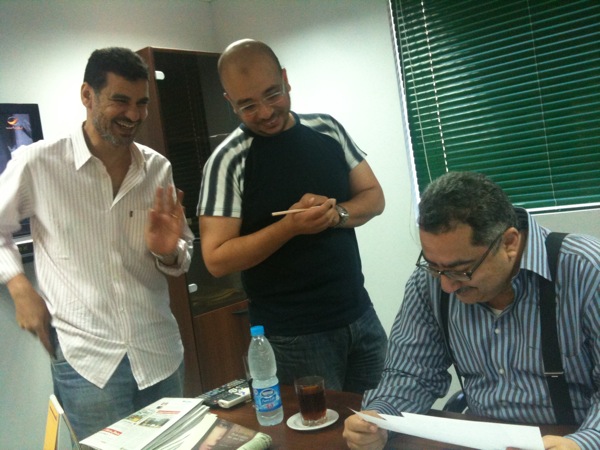Pushing the Boundaries
CAIRO, Egypt — On the fourth day of publication, Ibrahim Eissa bounds into the newsroom of Tahrirnewspaper, his latest anti-establishment venture and quite literally the offspring of Egypt’s January uprising. It’s midday, and he’s ready to plough through the day’s diet of news stories, opinion columns, and satirical cartoons that seem poised to make this tabloid the paper of record for the demographic known here simply as “the youth of the revolution.”
He’s wearing his trademark brown suspenders, and his trapezoidal mustache twitches as he hails the receptionist, the foreign news editor, and the managing editor.
“I’m the oldest person here,” proclaims Eissa, who appears also to be the most energetic. He later explains that youthfulness is a point of pride in Egypt’s gerontocracy, where the octogenarian president appointed septuagenarian deputies to run his police state. Field Marshal Mohammed Tantawi, Egypt’s current leader, is 75.
Tahrir launched at the beginning of July after months of planning. The paper is determined to challenge authoritarianism and corruption, and to cross whatever red lines Egypt’s rulers try to draw around a free press.
“Before, Mubarak was the red line,” Eissa says as he discusses the paper in his narrow corner office, as editors parade through. “Now the Supreme Council of the Armed Forces has replaced Mubarak. They don’t want anyone to criticize them directly.”
Eissa still tends the most boisterous patch of Egypt’s still-tender garden of free expression. At 45, the veteran editor might boast the toughest hide of any Egyptian journalist. During the long tenure of President Hosni Mubarak, Eissa was fired from nearly a dozen jobs and dashed all the regime’s taboos. In 2007, he was sentenced to a year in prison for writing about Mubarak’s failing health, which was treated as a state secret. (The sentence later was overturned on appeal, but the case successfully muzzled the Egyptian press.) For five years, he ran the liveliest paper in Egypt, Al Dostour (“The Constitution”), building it into enough of a threat that in October 2010 Mubarak had a crony buy the paper and fire Eissa the next day.
Read the rest in The Atlantic.


